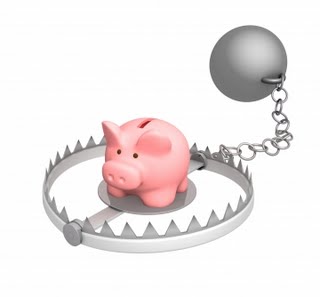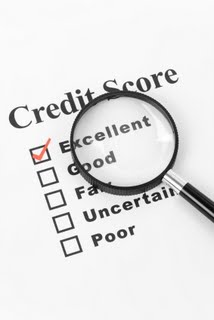Archive for August, 2009
Monday, August 31st, 2009
 A credit card is one of those double edged swords. In the realm of credit you need one or two cards to maintain healthy credit scores. With the current FICO model, it is paramount that you have a minimum of one credit card reporting to your personal credit report. When it comes to getting a mortgage loan, the banks usually like to see 3 trade lines reporting good activity with 3 different creditors for the last 12 to 24 months. You can see how no credit cards or credit could affect your ability to get a loan. A credit card is one of those double edged swords. In the realm of credit you need one or two cards to maintain healthy credit scores. With the current FICO model, it is paramount that you have a minimum of one credit card reporting to your personal credit report. When it comes to getting a mortgage loan, the banks usually like to see 3 trade lines reporting good activity with 3 different creditors for the last 12 to 24 months. You can see how no credit cards or credit could affect your ability to get a loan.
The reason to have credit is to show creditors you have the ability to pay back your debts borrowed. When it comes to calculating your credit scores, it’s real simple. How much credit do you have? How long have you had it? How much credit is charged vs. limit of credit line? What is your credit history? With all of this being said, a credit card is a must to maintain healthy credit.
There however is a downside to the matter. Once you have a credit card you must be responsible with that card. It’s very easy to charge too much on credit card and get yourself in trouble. Credit Cards are not designed to buy what you cannot afford to pay off in a couple of months. When charging on a credit card, you should never charge more than you can afford to pay off that particular month. When you find yourself charging more than you can pay off that particular month, at that point you are heading down a risky road. The fees and interest on a card are high, and can get out of control once you have charged close to the limit a credit card company has extended to you. This is where most get in trouble real quick. With the FICO score model, you don’t want to charge more than 20% of the allowed credit limit.
Credit Scores decreased – When you have charged up the credit limit that was extended to you, the credit card company and FICO model consider you a higher risk. Two situations can result from this. You credit score can be lowered, along with your credit cards fee’s going up. You can see how credit cards are a necessary evil and how responsibility is a must. This is the whole basis by which creditors judge your ability to pay them back so in a nut shell credit cards are necessary, but they come with responsibility as well.
So with all of this being said, get your credit card today……..
CreditScoreQuick.com your resource for credit.
Posted in Uncategorized | Comments Off
Tuesday, August 25th, 2009
-766975.jpg)
Before you choose a checking account, check to see what kinds your bank of choice offers, and the fees associated with them.
Banks do want your business, and many still offer gifts as an incentive to open an account with a sizeable deposit. Others offer gifts if you promise to use their online services to pay bills. But don’t let the gifts make your decision. Check services and fees first.
A basic checking account is fine for most people. But look out – they don’t pay interest and they may charge you if you write more than a set number of checks per month or impose a fee if your account balance dips below a certain dollar figure.
Free checking generally means you can write all the checks you want and let your balance fall to a dollar without paying fees. But you’ll pay hefty fees if you have an overdraft. You may also pay fees for other services such as check cashing, account inquiries, and debit card purchases.
Interest-bearing accounts usually require a minimum balance to open and require you to maintain a minimum balance. If you dip below that balance, the fees could far outweigh the low interest rate you’ll get in return. This account is usually not worth the trouble.
Express checking accounts are geared toward students and others who don’t want to spend a lot of time on transactions. Most business is conducted on line or by telephone or ATM. Most charge a fee if you decide to visit the bank and speak with a live teller.
Senior and Student Checking Accounts give special treatment to students and those over 55 years of age. Benefits include free checking, free cashiers and travelers checks, and even discounts on such things as prescriptions and travel expenses.
Money Market Checking Accounts are for people who can maintain high balances and who will need to write only a few checks each month. It pays more interest than basic checking or savings accounts while keeping funds easily accessible.
Business Checking is the most expensive, with fees per item deposited and per check written.
Before deciding which checking account you need, examine your own habits. For most a free checking account is the best choice – and of course seniors and students should take advantage of the special treatment banks offer to them.
But if you have sizeable reserves and want to have them instantly available, an interest bearing account or Money Market Account could be the right choice for you.
Other fees you should watch for are:
Abandoned account fees – if you let an account lay dormant for 3 to 5 years, the bank will hand your money over to the state – but not before deducting a sizeable fee.
Account maintenance fees – some banks charge a monthly fee no matter what.
ATM fees – You could pay on both ends for use of an ATM not associated with your bank. That $100 withdrawal could easily end up costing $106 – $110!
Debit Card Purchases – Have been without additional cost, but a growing number of banks are imposing fees for each purchase. Saying “credit” instead of “debit” at the check-out counter might transfer the fee from you to the retailer.
Check printing – Most banks charge for printing, but a few accounts do offer free checks. Sometimes checks through the bank are far more expensive than those you could order on line.
Counter checks – if you run out of checks and have to get a few from a teller to tide you over, most banks won’t charge, but some will.
Bounced deposits – If you deposit a check and it bounces, your bank may impose a fee.
Author: Mike Clover
Posted in Uncategorized | Comments Off
Monday, August 24th, 2009

You’ve no doubt been told about the crash in 1929 – when the banks closed and depositors were just out of luck. Back then there was no FDIC to insure your deposits, but now there is, so the threat is not so dire.
Still, FDIC only insures up to $250,000, so if you have more, you should spread your accounts between different banks.
Hopefully we’ll never have another widespread crash. What consumers deal with now is one bank failing. In that instance, one of three things should happen:
• Another bank takes over the complete institution
• The bank’s insured deposits are transferred, but loans and uninsured deposits ae left to the FDIC
• The FDIC takes over until a buyer can be found
You’ve read about the JP Morgan takeover of Washington Mutual – no branches closed and the acquiring bank merely took over. Much the same happened when Bank of America acquired Countrywide.
Here’s how some of your services could be affected if your bank fails:
• ATM’s – Transactions should go through, but posting may be delayed. Keep careful records of what you’ve done.
• Automatic payments – should be made on time, but do check rather than assume
• Checks – All should be normal. If the new bank plans to make changes to your account, they should contact you.
• Insured deposits – the acquiring bank will take these and continue with the same interest rate you were receiving.
• Uninsured deposits – NOT a good idea! The acquiring bank may take them or may not. Right now the ratio is about 50-50, so don’t take chances.
• Brokered Deposits – also can be risky. Talk with your broker to make sure your deposits are not in the same bank with your other accounts – thus pushing you over the $250,000 insured limit.
• Dormant accounts – Use your accounts regularly, as accounts not used for 18 months will be turned over to your State.
• IRA’s – These are ensured and will be turned over in their entirety.
• Loans – Loans may be acquired or held by the FDIC while a new buyer is found. This is done on a case by case basis. If you’re in the midst of a construction loan, you will probably be able to continue with scheduled draws.
• Online banking – Banks that fail close on a Friday, and the new bank or FDIC officially takes over on Monday morning. Online banking would not be available over the week-end.
• Overdraft lines of credit – should not be affected and will be taken over by the new bank.
• Night deposit boxes will still accept deposits for posting on Monday.
Unless you have uninsured accounts or dormant accounts, the biggest disruption in your banking services will be the inability to do business over the week-end. Banks usually open on Saturday will be closed and on line services unavailable.
Author: Mike Clover
CreditScoreQuick.com your resource for free credit reports, credit cards, loans, and ground breaking credit news.
Posted in Uncategorized | Comments Off
Thursday, August 20th, 2009
 If you’re headed off to college this fall you should not be anxious to get into debt, but you should be getting a credit card or two before February. If you’re headed off to college this fall you should not be anxious to get into debt, but you should be getting a credit card or two before February.
That’s when the new credit card regulations come into effect, and once they do, only those students with a job or a co-signer will have access to new credit cards.
Why should you care?
Because now is the time for you to begin building credit to use after graduation, and wise use of a credit card will help accomplish that goal.
If you’re just starting school, or already a student, do the research and find a card with the best rates and terms. Don’t just respond to any solicitation that might come in the mail. Instead, compare the offerings.
Look for a card with no annual fee and ask for a credit line that’s large enough to allow for occasional use of the card without exceeding 30% of available credit. Stay away from the “fee harvester” cards – those are the ones that charge an application fee, an annual fee, a fee for each use, a fee for non-use, a fee for paying the bill on line, and many others.
If that’s the only kind you can get, try instead to find the co-signer so you can be eligible for a better card.
As long as you’re doing research, look for a card that gives rewards for the purchases you’re likely to make. Some cards offer rewards for eating out while others reward you for renting movies, buying CD’s, or even buying your textbooks. If you’re going to be flying home for holidays, you might want to consider a travel rewards card.
Building your credit now by making small purchases and paying the balance in full each month will pay dividends after graduation. When your credit scores are high you’ll find it easier to get a loan for such necessities as a car, and you’ll have an easier time renting an apartment or home. Also, unless the rules change to prevent employers from checking credit, you’ll have an advantage when job hunting. You’ll even pay less for insurance.
Another way to begin building your credit score is to be added as a user on someone else’s credit card. That is, of course, if their credit is good and they pay that card on time, every time. This practice, called piggybacking, was disallowed for a time, but is once again in use.
You don’t have to actually carry or use the card – you only need to be named as a user. So if you have a relative with outstanding credit, ask them to add you to one of their credit card accounts.
Author:Marte Cliff
CreditScoreQuick.com your resource for free credit reports, credit cards, loans, and ground breaking credit news.
Posted in Uncategorized | Comments Off
Friday, August 14th, 2009
We all know that if you opt-out of a credit card rate increase, that’s the end of using that card. They’ll close your account – or at least close the part that allows you to use it again.
The account will remain open for receiving payments, and it will remain on your credit report – showing both the credit line and the balance owed at the time of each month’s statement.
But what then?
If you’re at a rate of say, 8.9% and they notify you of an increase to 16.9%, you can opt-out and keep paying 8.9% until your balance is paid in full.
Or can you?
As it turns out, the answer is no. You mustn’t assume that your rate will remain at 8.9% just because you took this action.
Your credit card issuer can come back in a few months and raise the rate again. They need only give you 15 day’s written notice of the change before it goes into effect. Considering possible delays in mail time, consumers taking vacations or working away from home, and a variety of other factors, you might not even know about the latest change until it’s too late to prevent it.
That is, if you read the mail at all. Since most people assume that they’ve done what they needed to do and their rate is set until the balance is paid, they don’t read that notice and thus don’t even know that they need to action in time to avoid a rate increase.
Under the new Credit Card Accountability, Responsibility and Disclosure Act that will go into effect in February 2010, the card issuers won’t be allowed to apply a rate increase
for “any reason or no reason” as they can now.
The only time they’ll be able to raise rates is
1. If your account is 60 days past due
2. If you’ve signed up for a variable rate tied to an index and the index changes
3. When a promotional period expires
When it comes to dealing with credit cards, February 2010 can’t come too soon for most of us. In the meantime, do read every piece of mail you receive from your credit card issuer.
Not only could it tell of a rate increase, it could give notice of a drop in your credit line that could cause you trouble. Should you inadvertently use a card whose line has been lowered you could find yourself looking at over-limit fees or an embarrassing denial of credit at a retailer’s.
Author:Marte Cliff
CreditScoreQuick.com your resource for free credit reports, credit cards, loans, and ground breaking credit news.
Posted in Uncategorized | Comments Off
Wednesday, August 12th, 2009
Behavior scores aren’t just for grammar school children any more. In fact, if you have ever used a credit card, there’s a behavior score on you somewhere. There’s also a fraud score, based on the same information.
You may have been thankful when you got a call from a credit card issuer asking if you were the one to make a recent purchase. And that’s good – if a thief steals your credit card and tries to buy a new stereo system for several thousand dollars, you want him stopped.
The reason they called is because the purchase was not consistent with your usual credit card use, and that sent up a red flag. That means that your credit card companies are watching what you spend from month to month. The fraud score alerts them that buying expensive electronic equipment is not your normal behavior.
Behavior scores are calculated to evaluate the risk you pose to the credit card issuer.
If you go along from month to month, paying each balance in full, that becomes your normal behavior. If you suddenly start carrying a balance, and that balance starts growing as you begin paying only the minimum each month, your card issuer begins to wonder what’s going on in your life.
Further, if you use your card primarily for purchases at upscale boutiques, concert halls, and night clubs, that becomes your norm. If you suddenly begin buying clothing at Wal Mart or charging groceries, it sends up a big red flag.
That change in behavior could signal a change in circumstances, such as a job loss that could eventually render you unable to make your payments.
What will the card issuer do about it? In most cases, your credit limit will be decreased and your interest rate will increase. That means your minimum payment will also increase, so if you’ve been having a hard time and the payment is difficult to meet, you’ll now have a larger payment.
Your card issuer will also look at your behavior scores to decide if they want to reissue the card when it expires. If your behavior has changed drastically, they may decide that they don’t want to extend any more credit to you.
On the other hand, if you’re a good risk but aren’t generating profit, they’ll use your behavior scores to decide if they should drop your account or do something to encourage more use. Then you could begin receiving notices of a credit line increase, promotional interest rates, and convenience checks.
Author:Marte Cliff
CreditScoreQuick.com your resource for free credit reports, credit cards, loans, and ground breaking credit news.
Posted in Uncategorized | Comments Off
Tuesday, August 11th, 2009
 Now that the market is flooded with more job seekers than there are jobs, employers are using credit reports as a way to eliminate some applicants. Now that the market is flooded with more job seekers than there are jobs, employers are using credit reports as a way to eliminate some applicants.
At one time credit checks were only required for government jobs or positions that could involve handling significant sums of money. Now, according to a 2004 survey, more than 40% of all employers use credit checks. This is up from 25% in 1998, and it’s likely to be higher today. As the pool of job seekers gets larger, more employers may have turned to this method to thin down the applicants.
Some believe that employers are using this method as a thinly veiled manner of discrimination – calling it “proxy discrimination” Employers claim that it is merely due diligence on their part. If a person has poor credit it could signify poor judgment, unreliability, and a greater threat of on-the-job theft.
In reality, people are being turned down for jobs that have nothing to do with handling money. Job counselors argue that poor credit does not diminish a person’s skills.
Whatever the reason, using credit checks against potential hires creates a lose-lose situation. Those who have been jobless the longest are the ones most likely to have gotten behind on payments. They won’t be able to improve their credit scores without a job, and can’t get a job without a good credit report.
Federal law requires potential employers to get permission before obtaining a credit report on a potential employee, so those faced with diminished credit scores might want to check policies before making a fruitless application.
The good news, at least for the jobless in some States, is that lawmakers are starting to recognize the problem and take action.
In Washington, under a law that took effect in 2007, the applicant’s credit history must be substantially related to the position. Last month Hawaiian lawmakers approved a similar measure. Hawaii also restricts employers from checking credit prior to making a job offer. Meanwhile, in California Governor Schwartzenegger vetoed a similar law.
Lawmakers in Michigan and Ohio have not taken action yet, but have proposed prohibiting employers from using credit history against a job applicant. At this rate, it could be a long time before all employers are prohibited from using poor credit scores as a way to deny jobs, but at least they’re moving in the right direction.
On a Federal level, the Equal employment Opportunity Commission is likely to issue guidelines on the proper use of credit checks. The bad news is that they’re merely guidelines. Employers aren’t required to comply.
Author:Marte Cliff
CreditScoreQuick.com your resource for free credit reports, credit cards, loans, and ground breaking credit news.
Posted in Uncategorized | 1 Comment »
Saturday, August 8th, 2009
 Identity theft is a growing business, and it results in losses for both consumers and creditors. Why, then, are banks and other credit issuers resistant to implementing the rules? Identity theft is a growing business, and it results in losses for both consumers and creditors. Why, then, are banks and other credit issuers resistant to implementing the rules?
Apparently the cost and bother of compliance is more expensive than the losses they might incur if they extended credit to identity thieves. Resistance has been so great that enforcement of the rule, which was originally issued in November 2007, has now been delayed three times. The new deadline for compliance is November 1, 2009.
Under the Red Flag Rules, any entity that extends credit will be required to develop and implement written identity theft prevention and detection programs to protect consumers from identity theft.
Who objects most strongly? One of the strongest opponents is the American Medical Association. Under the new law, the FTC classifies physician practices are “creditors” when they accept insurance and bill patients after services are provided or if they allow patients to set up payment plans after services have been provided. Thus, they will be required to comply with the Red Flag Rules.
The AMA wants physicians to be excluded from the law, stating that they should not be classified as “creditors” and that compliance will place too great a burden on medical practitioners. However, lawmakers are particularly concerned with “medical identity theft.”
Using someone else’s identity to obtain medical services under an insurance policy is fraud, and the resultant fictitious medical records placed in a victim’s name could be medically dangerous.
Banks and other creditors also object. Some are already planning ways to override the process.
What’s the problem? Smaller businesses may not have the manpower to comply and will need to hire third-party companies to ensure red flag rule compliance. This will be an ongoing financial burden. Banking associations are calling the rules “excessive and overly burdensome.”
Perhaps they’re right, because the law does list 26 red flag triggers that must be monitored. These include obvious red flags such as a fraud alert or a freeze on a credit report, or inconsistent addresses from one document to another.
Other red flags will require more care. For instance, credit issuers will be expected to conduct careful scrutiny of identification cards to detect alteration or forgery. Others, such as a change in spending patterns, use of the same address or phone number by multiple applicants, or duplicate social security numbers, will require research. Another red flag that creditors will be expected to notice is a lack of correlation between Social Security number ranges and dates of birth. Hopefully there’s a handy chart somewhere to make that quick and easy.
If all credit issuing entities come into compliance with these rules, identity thieves are going to have to come up with new ways of doing business. And of course, they will.
Author: Mike Clover
CreditScoreQuick.com your resource for free credit reports, credit cards, loans, and ground breaking credit news.
Posted in Uncategorized | 1 Comment »
Wednesday, August 5th, 2009

When a consumer is desperate to get out from under a huge mortgage payment, he or she may consider many options. Each has a different effect on credit scores.
The choices include:
• Letting the house go to foreclosure
• Signing a deed-in-lieu of foreclosure
• Bankruptcy
• A short sale
• A refinance, or
• A loan modification.
A foreclosure and a deed-in-lieu of foreclosure both have a significant impact on your credit scores, but taken by themselves are not as damaging as a bankruptcy.
If all of your other accounts are current, the foreclosure is a serious blot on your credit report, but is just one blot. And, while it will stay on your credit report for 7 years, your scores can begin to improve in about two years if you are steadfast in keeping all your other accounts current.
A deed-in-lieu of foreclosure is the same – you’re just spared the time and cost of the foreclosure process. In both cases, the lender may obtain a judgment against you for the deficiency – the difference between your loan amount and the price the home sells for after foreclosure. This judgment is another serious hit to your credit scores.
A bankruptcy may allow you to keep your home, but since it means you are defaulting or wiping out many other accounts, it can affect your credit score even more negatively than a foreclosure. A bankruptcy may remain on your credit report for ten years.
Short sales may or may not impact your credit scores – it all depends upon how the lender reports the transaction to the credit bureaus.
In many cases, it is reported just like a foreclosure – It can be reported as a “settled debt,” which will damage your scores. However, in some instances, and if you ask for the concession as part of the short sale negotiation, lenders will report it as “paid in full.”
If you do ask for the concession, be sure to have the bank’s commitment in writing. You should also ask for a written agreement saying that the short sale represents a “total satisfaction of debt.” Otherwise, they can come back later and ask you to pay the deficiency.
Refinance or loan modifications don’t hurt your scores. In fact, they may improve your scores because your monthly debt to income ratio will go down. Of course, that improvement will be wiped out if payments on the new or modified loan are not made on time.
Author: Mike Clover
CreditScoreQuick.com your resource for free credit reports, credit cards, loans, and ground breaking credit news.
Posted in Uncategorized | 2 Comments »
Monday, August 3rd, 2009

You hear a lot of talk about the Making Home Affordable plan pushed through by the Obama administration, but you don’t meet too many people who have had success in getting their mortgage loans adjusted.
Why? It’s not lack of money. This is a $75 billion program designed to prevent foreclosures and give relief to troubled homeowners whose incomes have plummeted in recent months.
The answer lies in conflict of interest. Mortgage companies that service loans are paid $1,000 from the Federal Government when they modify a loan. Then they are paid an additional $1,000 per year for the next three years. Treasury officials believed that these payments would be enough incentive to loan servicers to assure their cooperation, but it isn’t so.
Mortgage loan servicers collect a percentage of the value of every loan they service – year in and year out. Then, when a loan goes into default, they begin collecting fees, beginning with late charges which can equal 6% of the monthly payment. When the loan finally gets to the foreclosure stage, they get to collect even more.
According to a New York Times report, Owen Financial reported that almost 12% of it’s 2007 income came from fees paid by borrowers.
The good news for homeowners struggling to get back on track after missing a few payments is that loan servicers don’t seem to be in a hurry to push those loans as far as foreclosure. The longer they stay on the books, the more dollars keep coming in. Thus, while the number of mortgage loans showing 90 days late nearly doubled from June of 2008 to June of 2009, the number that transferred ownership to a bank declined by almost 1/3.
It seems almost as if the loan servicers are using these delinquent loans as a sort of interest-bearing savings account, because once a mortgage loan does go to foreclosure the revenues become even higher.
Management fees charged to investors for taking control of the property, getting it ready for resale, and handling the sale can be extremely lucrative. In addition, they are able to funnel orders for insurance policies, appraisals, title searches, and legal filings to companies that they own.
Some mortgage servicing companies have established their own Title companies, just because of the huge profits involved. They are allowed to charge for title work when the home is transferred to the lender, then when it is transferred to the new buyer, and finally they are able to sell the Title Insurance to the new buyer.
The Federal Government may want loans modified to help troubled homeowners. The Mortgage Loan Servicers may have a completely different agenda.
Author: Mike Clover
CreditScoreQuick.com your resource for free credit reports, credit cards, loans, and ground breaking credit news.
Posted in Uncategorized | Comments Off
Disclaimer: This information has been compiled and provided by CreditScoreQuick.com as an informational service to the public. While our goal is to provide information that will help consumers to manage their credit and debt, this information should not be considered legal advice. Such advice must be specific to the various circumstances of each person's situation, and the general information provided on these pages should not be used as a substitute for the advice of competent legal counsel.

|
 A credit card is one of those double edged swords. In the realm of credit you need one or two cards to maintain healthy credit scores. With the current FICO model, it is paramount that you have a minimum of one credit card reporting to your personal credit report. When it comes to getting a mortgage loan, the banks usually like to see 3 trade lines reporting good activity with 3 different creditors for the last 12 to 24 months. You can see how no credit cards or credit could affect your ability to get a loan.
A credit card is one of those double edged swords. In the realm of credit you need one or two cards to maintain healthy credit scores. With the current FICO model, it is paramount that you have a minimum of one credit card reporting to your personal credit report. When it comes to getting a mortgage loan, the banks usually like to see 3 trade lines reporting good activity with 3 different creditors for the last 12 to 24 months. You can see how no credit cards or credit could affect your ability to get a loan.


-766975.jpg)






